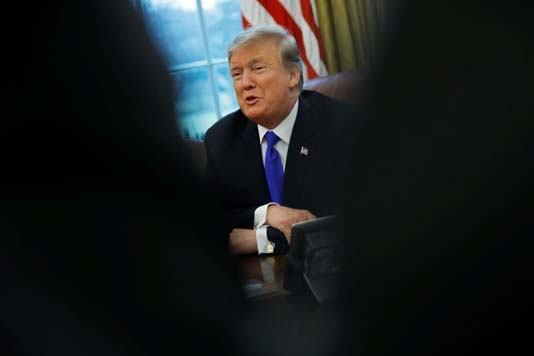WASHINGTON, May 24, 2019 (BSS/AFP) – President Donald Trump on Thursday for
the first time linked a dispute over telecom giant Huawei, which he views as
a threat to American security, with a deal to resolve the US-China trade war.
“Huawei is something that is very dangerous,” Trump told reporters at the
White House. “You look at what they’ve done from a security standpoint, a
military standpoint. Very dangerous.”
That notwithstanding, Trump said there is a “good possibility” Washington
will reach an agreement with Beijing to end the escalating trade conflict,
and that “it’s possible that Huawei would be included in a trade deal.”
The two sides have hardened their stands over Huawei, with the US
blacklisting the smartphone and telecommunications company over worries that
China uses it as a tool for espionage, while Beijing has accused Washington
of “bullying” the firm.
Trump’s comments directly contradicted statements from US Secretary of
State Mike Pompeo, who said just hours earlier that Huawei and the trade
issue were not linked.
In an interview on CNBC, Pompeo stressed that there are two separate
elements: “the national security component” and efforts “to create a fair
reciprocal balanced trade relationship between the two countries.”
“I hope that we can keep those issues in their own place. We have an
imperative to protect American national security. We have a need to make sure
we get these trade rules right,” Pompeo said.
Pompeo also rejected Huawei’s statements about its relationship with
China’s government and said any data touched by the company is “at risk” of
falling into the wrong hands.
“To say that they don’t work with the Chinese government is a false
statement,” Pompeo said. Huawei “is deeply tied not only to China but to the
Chinese communist party.”
China had already drawn a link between the two issues, accusing the US of
“bullying” Huawei.
Chinese Foreign Minister Wang Yi on Wednesday warned that Beijing was ready
to “fight to the very end” in its trade war with Washington.
“The US use of state power to arbitrarily exert pressure on a private
Chinese company like Huawei is typical economic bullying,” Wang said.
– Japanese, British firms respond –
US lawmakers appeared to rally around Washington’s position with a
bipartisan proposal to help telecom networks remove Huawei as they upgrade to
5G systems.
The bill is aimed at preventing “companies subject to extra-judicial
directions of a foreign adversary to infiltrate our nation’s communications
networks,” said Democratic Senator Mark Warner.
Companies around the world were scrambling to comply with the US blacklist,
which would prevent them from supplying American technology components or
software to Huawei.
Japan’s Panasonic was the latest to announce it would suspend transactions
with Huawei. But when asked for a response, Huawei pointed to a statement on
Panasonic’s Chinese website that said the firm was supplying Huawei
“normally.”
Japanese firm Toshiba said it had resumed shipping products to Huawei hours
after announcing a temporary halt to check whether US-made parts were
involved.
Major Japanese and British mobile carriers said this week they would delay
releasing new Huawei handsets as a result of the US sanctions.
In the US, equipment makers Inphi Corp, Qorvo, Neophotonics and Rogers
Corp. all said they would see lower sales due to the Huawei sanctions.
– ‘National emergency’ –
Last week, Trump declared a national emergency to bar US companies from
using foreign telecom equipment deemed a security risk — a move seen as
targeting Huawei.
The Commerce Department also announced a ban on US companies selling or
transferring technology to Huawei, though it later issued a 90-day reprieve.
Google said it would cut off Huawei devices from some services on the
Android operating system.
Huawei has since indicated that it could roll out its own mobile operating
system this year in China and internationally next year.
Analyst Richard Windsor, who writes the Radio Free Mobile tech blog, said
Huawei’s prospects without Google are limited.
“Whatever alternative Huawei comes up with for Google’s digital ecosystem
is extremely unlikely to be able to prevent an almost complete loss of market
share in markets outside of China,” Windsor said.



